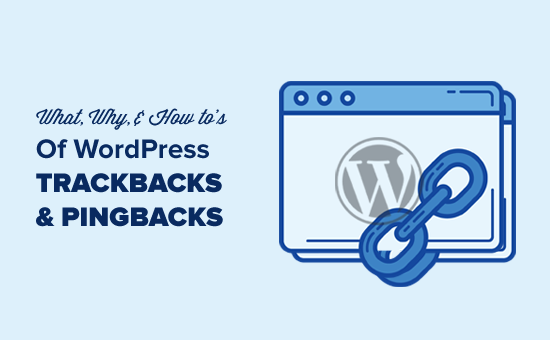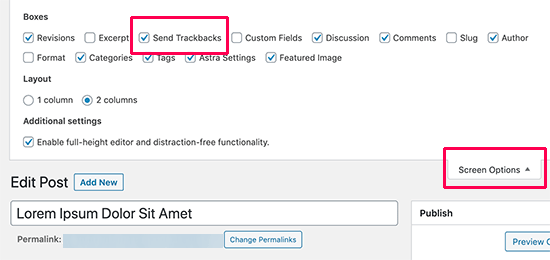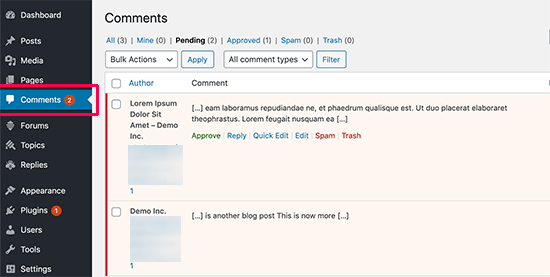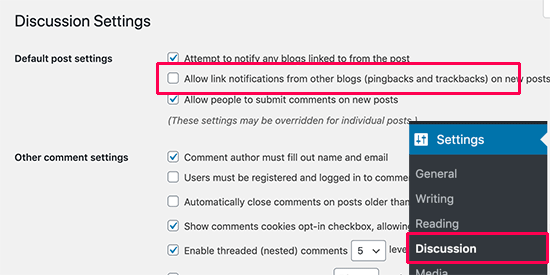Você já viu “trackbacks” e “pingbacks” no WordPress e se sentiu confuso? Não se preocupe, muitas pessoas o fazem. Essas são ferramentas de blog do WordPress que nem mesmo alguns usuários experientes entendem completamente.
Trabalhamos com o WordPress há muito tempo e estamos bastante familiarizados com trackbacks e pingbacks. Eles podem ser úteis, mas também podem causar problemas. Eles foram criados para ajudar os blogs a se comunicarem entre si, mas agora os spammers costumam fazer mau uso deles.
Neste guia, explicaremos o que são trackbacks e pingbacks em termos simples. Mostraremos como eles funcionam e como usá-los (ou desativá-los, se você não quiser).

Sinta-se à vontade para usar os links rápidos abaixo para navegar pelos diferentes tópicos deste artigo:
O que é um Trackback?
Um trackback no WordPress é como uma mensagem amigável entre dois sites. Quando um site menciona ou faz um link para uma publicação em outro site, ele envia um trackback para que o outro site saiba disso. Veja como funciona:
- Digamos que você esteja escrevendo uma postagem no WordPress. Em sua publicação, você inclui um link especial chamado URL de trackback para outra publicação em um site diferente do WordPress. É como um código secreto encontrado nas informações da postagem vinculada.
- Quando você publica sua postagem, seu site envia um trackback para o link que você incluiu. Esse trackback contém detalhes sobre sua postagem, como o título e um pequeno trecho de texto.
- O outro site WordPress recebe seu trackback e verifica se é um link válido e relevante. Isso funciona como uma verificação amigável para ver se sua postagem se encaixa bem na deles.
- Se tudo estiver certo, o trackback aparecerá na seção de comentários da publicação vinculada. Ela tem uma aparência um pouco diferente dos comentários comuns, geralmente mostrando o título da publicação e um trecho do conteúdo.
O que é um Pingback?
Um pingback no WordPress é uma mensagem automática que um site envia a outro quando há um link para seu conteúdo. Veja como funcionam os pingbacks no WordPress:
- Você escreve uma postagem com um link para outra postagem em um site diferente do WordPress.
- Quando você publica uma postagem, o site do WordPress envia automaticamente um pingback para o site para o qual você fez o link. Esse pingback inclui detalhes sobre sua publicação, como o título e um pouco de texto.
- O outro site WordPress recebe seu pingback e verifica se o link é bom e faz sentido. É uma verificação amigável para ver se sua postagem se encaixa bem com a deles.
- Se tudo estiver correto, o pingback aparecerá na seção de comentários da publicação vinculada como um link para o seu site.
Os pingbacks também funcionam em seu site. Isso significa que, se você criar um link para um de seus próprios artigos no mesmo site, o WordPress enviará automaticamente um pingback para si mesmo.
Isso é chamado de self-ping e, quando você começa a blogar regularmente, pode achar os pings irritantes. Não se preocupe, eles podem ser facilmente desativados, como mostraremos mais adiante neste artigo.
Qual é a diferença entre trackbacks e pingbacks?
Na verdade, não há muita diferença entre pingbacks e trackbacks. Ambos fazem a mesma coisa, mas adotam uma abordagem ligeiramente diferente.
A primeira diferença é que os trackbacks são manuais, enquanto os pingbacks são automáticos, pois usam tecnologias de comunicação diferentes.
Em segundo lugar, os pingbacks não enviam o trecho da publicação, enquanto os trackbacks o fazem.
Como enviar trackbacks e pingbacks no WordPress
Desde o WordPress 5.0, a capacidade de enviar manualmente um trackback para outros blogs foi removida da tela do editor de blocos. Poucos usuários usam muito esse recurso, e o WordPress já ativou os pingbacks automáticos por padrão.
No entanto, se você usar o editor clássico, a funcionalidade ainda estará disponível. Basta editar uma postagem no editor clássico e você encontrará a opção de enviar trackbacks abaixo da área de edição.

Se não conseguir encontrar a meta-caixa de trackbacks no editor clássico, clique no botão “Screen Options” (Opções de tela) no canto superior direito da tela.
Você precisa marcar a caixa ao lado da opção “Enviar trackbacks”, e o WordPress começará a mostrar uma caixa de envio de trackbacks abaixo da área de edição.

Como moderar pingbacks e trackbacks no WordPress
Em nossa experiência, 99% de todos os trackbacks e pingbacks são spam. Essa é a maneira mais fácil para os spammers obterem um backlink de seu site.
Em nosso caso, frequentemente vemos pingbacks de scrapers de conteúdo (ladrões de conteúdo) que copiam nossos artigos inteiros, palavra por palavra, incluindo todos os links.
Devido a esses links, o software de blog deles envia automaticamente pingbacks para nossos artigos.
As poucas vezes em que achamos que os trackbacks/pingbacks foram úteis foi quando blogueiros legítimos criaram links para nós. Na verdade, eles nos ajudaram a descobrir que estávamos em destaque no Mashable e no NYTimes.
Em resumo, descobrimos que 99% de todos os trackbacks/pingbacks são spam. Esse é o motivo pelo qual os desativamos totalmente. Não vale a pena perder tempo moderando uma tonelada de spam.
Há outras maneiras de descobrir quem criou links para seus artigos. A maneira mais fácil é usar o Google Analytics para descobrir quem está vinculado ao seu site.
Dito isso, se você ainda quiser usar trackbacks e pingbacks, é bom moderá-los para evitar spam. O que você precisa fazer é ir para Configurações “ Discussão na área de administração do WordPress.
Em seguida, na seção “Antes de um comentário aparecer”, marque a caixa que diz “O comentário deve ser aprovado manualmente”. Isso garantirá que os trackbacks e pingbacks não apareçam automaticamente e precisem ser verificados quanto a spam.

Em seguida, você pode ir para a área de moderação de comentários do WordPress para verificar se há pingbacks e trackbacks pendentes.
A partir daí, você pode aprovar, excluir ou marcá-los como spam.

Como desativar Trackbacks, Pingbacks e Self Pings
Se você está cansado de receber trackbacks e pingbacks com spam, há uma maneira de desativá-los completamente.
Basta acessar a página Configurações ” Discussão e desmarcar a opção “Permitir notificações de links de outros blogs (pingbacks e trackbacks)”.

Desmarcar essa caixa só desativará trackbacks e pingbacks para postagens futuras (não para postagens existentes).
Para desativar trackbacks em postagens existentes, você deve seguir nosso tutorial sobre como desativar trackbacks e pingbacks em postagens existentes do WordPress.
Se você está cansado de ver o seu blog se autopingando, basta instalar e ativar o plug-in No Self Pings. Para obter mais detalhes, consulte nosso guia passo a passo sobre como instalar um plug-in do WordPress.
Após a ativação, o plug-in desativará as autoping em seu site do WordPress.
Bônus: habilidades essenciais do WordPress para iniciantes
Embora trackbacks e pingbacks sejam recursos específicos, há muito mais a aprender sobre os conceitos básicos do WordPress. Aqui estão alguns guias úteis para aumentar seu conhecimento sobre o WordPress:
- Se você está achando o WordPress desafiador, não está sozinho. Leia sobre por que o WordPress pode ser difícil e aprenda dicas para torná-lo mais fácil.
- Encontrar seu caminho no WordPress é crucial. Saiba como localizar publicações, categorias, tags, comentários ou IDs de usuários no WordPress.
- É importante gerenciar seu conteúdo com eficiência. Descubra como encontrar seus rascunhos salvos no WordPress, para que você nunca perca seu trabalho em andamento.
- Entender o desempenho do site pode ajudar seu blog a funcionar sem problemas. Descubra como liberar espaço em disco e reduzir o uso de inode no WordPress.
- É fundamental manter seu site atualizado. Saiba como testar seu tema do WordPress em relação aos padrões mais recentes.
Esperamos que este artigo tenha ajudado você a aprender sobre trackbacks e pingbacks do WordPress. Talvez você também queira ver nosso guia para iniciantes sobre como desativar os recursos do blog no WordPress e nossas escolhas de especialistas sobre os melhores plug-ins para gerenciar um blog WordPress com vários autores.
Se você gostou deste artigo, inscreva-se em nosso canal do YouTube para receber tutoriais em vídeo sobre o WordPress. Você também pode nos encontrar no Twitter e no Facebook.





Muhammad Atif
Hi, There is mistake under “what is pingback”, 4th point ” we “wikk”
WPBeginner Support
Thank you for catching that, we will get that typo fixed soon!
Admin
Iftekhar Bhuiyan
Helpful post indeed. Thank you.
On a personal level though, I stopped using it for quite some time now.
Marcia
I’m curious is it weird to approve self-pings? Internal linking is still a good thing but would there be any cons//would it just look weird? Thanks!
WPBeginner Support
It’s a bit of a personal preference question. It adds more admin tasks for you to do with the links to approve and you already have an internal link to cause the pingback so most do not find value in allowing self pings.
Admin
Christopher Wilson
I am so glad I discovered this website because it make everything so crystal clear especially if you are a beginner (I guess that’s why it’s named appropiately). I love it.
WPBeginner Support
Glad you found our content helpful
Admin
Mithu A Quayium
What about the real blogger who don’t spam. Don’t you accept their trackback/pingback then , even though they are legit ?
LaShaun W
Are there any advantages to approving a trackback. I just got one and I don’t know if I should or shouldn’t approve it. If someone clicks it, I risk losing a visitor, don’t I?
WPBeginner Support
Hi,
Yes, you can delete it.
Admin
Philip
Thank you for explaining TrackBacks.
I got two but the commenters name etc looked false and immediately raized the alarm.
So, if they do copy your article word for word, no one should panick, because Google will not give that copied post good ranking and they will hurt their website rankings! Or, am I missing something more important here?
I will disable trackbacks.
Thanks.
WPBeginner Support
Hi Philip,
Yes, you got that right. However, if you notice that someone with stolen content is outranking your articles in Google, then you can file DMCA and Google will remove those results. For more information, please see our guide on how to prevent blog content scraping in WordPress.
Admin
Sherry
Thank you so much for Tweeting this article! I just last week received 6 Pingbacks and had no idea what to do about them.
I had just moved from Blogger to WordPress.org earlier this year and I have been learning the platform and had never heard of Trackbacks and Pingbacks until last week.
I watched Your talk with Micheal Hyatt and learned so much too. I’m so glad I subscribed to Platform University and heard about your site it has been so helpful. I’m implementing a lot of the things you talked about with Micheal Hyatt.
Sherry
Editorial Staff
Thank you so much for the kind words Sherry. I’m happy to help
-Syed
Admin
Sinea
Thanks for the explanation. I would instantly stop all trackbacks and pingbacks if I were more experienced. I’ve been blogging for 7 years but only just moved from Blogger to WP. THANK GOODNESS FOR YOUR WEBSITE. Without it, I do not know what I would do!
I host two blog hops. I love meaningful comments from my guests at the parties as well as on other posts. Will disabling trackbacks or pingbacks interfere with my parties or real commentary? If it won’t, I’m disabling immediately. Another question… on existing spammy comments, is it better to mark them as spam or send them to the trash?
WPBeginner Support
Hi Sinea,
Thank you for kind words, we are glad that you find WPBeginner helpful. To answer your questions:
1. No, disabling pingbacks and trackbacks will not affect comments on your website.
2. It is better to mark spam comments as spam.
Admin
Sinea
Well, then, I will be disabling them! Thanks so much!
Sin Yee
Thanks for the explanation. Finally know what both of them are!
Janine
Thank you for addressing this! Honestly its a confusing topic. I recently had my post pinged back upon. (How on earth would one say that!?!)
I noticed that when she pinged me her post (in wordpress) automatically used my featured image for the post I had written.
I have pinged a different blogs post (not a wordpress blog) today and I don’t see if there is a way to include the image.
Is it still pinging if it is not a wordpress blog? Could that be what is different?
Thanks!
Tapiwa Zvakavapano
Greetings
I see there is an unanswered question in all this; If I do not approve a Pingback, will the link still work. I am afraid I am not as fawning as all the other people above. I run a recently launched blog; Network Bees and I have lots of links to your pages. All of them are genuine, ie, I read your articles and link to relevant, well written materials.
It worries me therefore, that all that effort is for nought because you are labeling all my links as spam. I may be confused about the whole thing, however. I think one of the comments above asked the same issue. Does disabling pingbacks and trackbacks mean that people cant link to a page? Or do the links still work nevertheless?
One of the things that I have discovered is that established bloggers tend to be a bit “detached” when it comes to interacting with new bloggers. There is this blog that allows guest posts but does not allow even a single link to the author’s blog! I mean, what would be the point? In any case, that’s a digression. My question is above….
WPBeginner Support
Hi Tapiwa,
When you link to another WordPress powered website, the link on your website will work just fine. If the site you are linking to has the pingbacks and trackbacks disabled, then they will not see the link in their moderation queue and will not be able to mark it as spam. You should keep working on your blog as you normally would.
Admin
Michelle Belanger
Thanks for this article and your site!
I got a rather generic comment with a link to a site in the UK that had content unrelated to my blog post (a garden photo post linked to a job seeking website). i approved the comment initially because I want people to read and respond to my posts. After reading this article, I went in and removed the links and left the comment by itself.
Is this method ever used as a way to break into someone’s site to hack it? Or is it just a way to get someone from another site to click their link and go to their site? Thanks again for your help with this subject.
WPBeginner Support
Hey Michelle,
Most links submitted in a comments are often spam. Some times these links can lead users to malicious websites. You need to carefully review comments before approving them. See our guide on how to deal with comment spam in WordPress for more information.
Admin
Arulmjoseph
Thanks for the information.
gumusdis
Perfect, Thanks for sharing these useful information with us.
Dattaraj
Very good article. Thanks for detailed explanation.
Liz Ziser
Great post! Thank you for sharing.
Personally, my confusion lies with moderation options. For example, if a legitimate blog links to my site, and I move it to “Trash”, is the link deactivated? i.e. It’s fine for them to link to me, but I don’t want the pingbacks displaying at the bottom of my post… so would this be the best selection?
I’d just like to better understand the consequence of each moderation selection: Approve, Unapprove, Trash, Spam, and Trash. What actually happens when each of these are selected.
Thanks a lot!!
ketul
hello i am confusion about pingback in my wordpress its affect on seo keywords?
Daren
Perfect! Been wondering about this for a while. Thanks for the focused “Don’t waster your time” advice.
Nebu John Thaliyath
Really Helpfull. Thank You
Sanjay Kumarr
Now I have good knowledge of Trackbacks and PingBacks, trackbacks are mannual with contents and pingbacks are automated / software based both will 99% spam.
Your article is very good and clearly belongs to questions that I was trying to find.
Good websites and information as well.
WPBeginner Support
Hey Sanjay, glad you found it helpful
Don’t forget to join us on Twitter for more useful WordPress tutorials.
Admin
Vasu
This was very useful. Just the information what I was looking for.
thanks
Vasu
Amit
This is very useful information for me too. Actually i was very confused before this. When i research on my website, that one trackback post show there.
After read this knowledgeable article about trackback and pingback . my problem has been solve.
Breanna
So, are pingbacks/trackbacks bad or good to get?
Chris Webb
Great Post, very thorough explanation on what these two types of linking mechanisms do.
Phil Owens
Hi,
Considering your title is what, how, why, you haven’t explained how to create a trackback. I am a complete noobie to blogging, so treat me like an idiot
Brendan Hall
I was going to use track backs on our site. We tried them for a while and we were just inundated with spamming comment (of which this comment is not lol). In the end I decided that is was not worth using track back at all.
Pushkar Kathayat
How to make a pingback for another blog?
Heather
Does disabling trackbacks and pingbacks affect my sites SEO?
WPBeginner Support
No it does not.
Admin
Luke Ward
Hi, If I disable pingbacks/trackbacks as you’ve suggested, will that also stop internal pinkbacks?
Thanks
Heike Martin
Internal pingbacks can be avoided by making sure that the url used only shows the extension of the full url. Look at the url for this post. To avoid self-pings you want the link to only read “/beginners-guide/what-why-and-how-tos-of-trackbacks-and-pingbacks-in-wordpress/”. This info is from the make.wordpress site. To do this add the link and check in text editor mode and delete the domain portion of the url
Robert
Thanks for this article on trackbacks and pingbacks. I had been thinking of the advantages of allowing trackbacks from genuine bloggers but if your experience is that 99% comes from spam then I don’t think the 1% is worth it.
I think I will place a prominent notice advising bloggers to use the Contact Me form to request a link up.
James
Have been reading the release notes on 4.0.1, specifically the XSS vulnerability in comments which launches upon moderating comments.
I don’t suppose any one would know if the trace ping backs could be exploited in the same way.